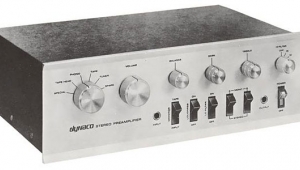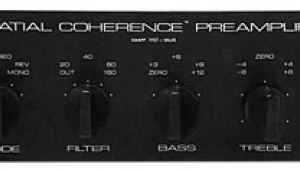| Columns Retired Columns & Blogs |
Linn Klimax Kontrol preamplifier & Klimax Twin power amplifier Page 3
Listening
In addition to the Quad ESL-989s, I tried the Linn Klimax Kontrol and Klimax Twin with Spendor's brand-new S3/5se loudspeakers (review to come in July) and my own Lowther/Medallion horns—the latter fitted with PM6A silver drivers, which are the least sensitive of the Lowthers I own.
In addition to the Quad ESL-989s, I tried the Linn Klimax Kontrol and Klimax Twin with Spendor's brand-new S3/5se loudspeakers (review to come in July) and my own Lowther/Medallion horns—the latter fitted with PM6A silver drivers, which are the least sensitive of the Lowthers I own.
In every case, the sound of the Linn combination had one important thing in common with the sound of the Quads: They were incredibly detailed without being the least bit bright or aggressive. Textures, inflections, nuances, and even nonmusical sounds were offered up clearly and organically—but never thrust forward in the relentless fashion of certain other products. For example, the plectrum attacks of the two acoustic guitars in XTC's "Love on a Farmboy's Wages" sounded much more real through the Linn combination than with my usual amps. Still, startling though they were in their clarity, and pleased with myself though I was for noticing them, those details didn't detract from the essential musical message.
So let's back up a sec and talk about that message, because that's where the Kontrol and the Twin found their most elemental success. I've never heard their betters in terms of dependably right pitches and timings—the sorts of things that compel me to listen late into the night rather than frustrate me into switching things off or, worst of all, falling asleep.
And they got more than the notes right: They got whole lines of notes right—things that some amps, like some conductors, can't seem to find. On the Bernstein recording of Ives' The Unanswered Question (LP, Columbia MS 6843), the Linn combination built the tension believably as it grabbed the overarching line carried by the strings throughout. String tone and texture were good here, too, if perhaps not quite as pretty and tactile as with a good SET.
The Linns got the rhythms right, too, while avoiding sounding quite like those other British amps known for the same thing. Here, instead of Naim Audio's "happy sound," as one wag has described it, I heard a more serene if no less mathematical approach to timing: Not quite as forward, but plenty of momentum nonetheless. Toe-tapping? Listen to "Grand Ole Opry Song," the Jimmy Martin performance that kicks off Will the Circle be Unbroken (LP, United Artists UAS 9801), and just try to hold still.
But you don't buy a 100W amp just for notes and beats, do you? Nossir: You buy one of these babies for sheer power—and the Linn Klimax combination did not disappoint.
I prefer the premiere recording of Anthony Payne's completion of Elgar's Symphony 3, with Andrew Davis and the BBC Symphony (NMC 53) [as do I—Ed.]. (I recently bought the recording with Paul Daniel and the Bournemouth Symphony, Naxos 8.554719, expecting a great performance and recording, and was mildly disappointed on both counts [as was I—Ed].) In the Davis are any number of subtle crescendos—not the beat-you-over-the-head sort, but the kind that sound more sly and organic. The Linns followed them and put them across in a remarkably easy and natural way, so much so that I could've sworn I was listening to tubes or a really good Naim NAP250, or perhaps even real music itself. (There's a joke in there, okay?) The music got bigger when it needed to, without losing its poise, and without the color or character of the orchestra changing perceptibly. And the colors of the chords in the brass, which are so crucial to the mood of the Adagio solenne (another regard in which the Daniel version falls wildly short of the Davis), were also pulled off with tube-like perfection.
And Ian Wilson was right: The Klimax combination was superbly transparent, so much so that other, more musically grounded words utterly fail to describe the experience. Music-making was explicit through it, sonic images of singers and instrumentalists coming to life clearly and naturally between the speakers, and with nothing unnatural around them—neither grain in the music nor tizz around it. A few audio friends heard the Linns during their time here, including a prominent manufacturer and a fellow reviewer whose name would be familiar to you, and none was less than impressed with their clear, open sound.
After hearing them through the Quads, the Klimaxes' performance with the Spendor speakers held no surprises, really, and beyond that, the differences heard after switching over to the Lowthers—apart from the obvious and expected contrast in sensitivity and dynamics—were the same as the differences between the speakers' own sonic fingerprints, nothing more. Of course, the Lowthers and the Quads do tend to "load" the room in ways quite different from each other, depending on the music played; if anything, the audibly more powerful Linn amp only contributed to the Lowthers' unique and appealing sense of scale and space: They simply became more so.
But driven by the Linns, the Lowthers still sounded like Lowthers: a little more pungent and a lot more bass-shy than the comparatively very neutral Quads, but, taken on their own terms, providing a very rewarding, involving experience. The only unpleasant consequence of the pairing was that the switching noise from the Klimax Kontrol—brief, static-like sounds accompanying the use of switches on either the preamp's front panel or handset—was audible from the Lowthers from a few feet away, while I had to get my ear right up next to one of the panels to hear the same thing from the Quads. Small price to pay, I say, for the outrageous increase in headroom that comes with driving a 103dB loudspeaker with 100W of clean power from an amp with a nonarthritic power supply—a state of affairs that will surely put any audiophile in good stead should The Almighty suddenly choose to express His thoughts via someone's stereo.
- Log in or register to post comments




































